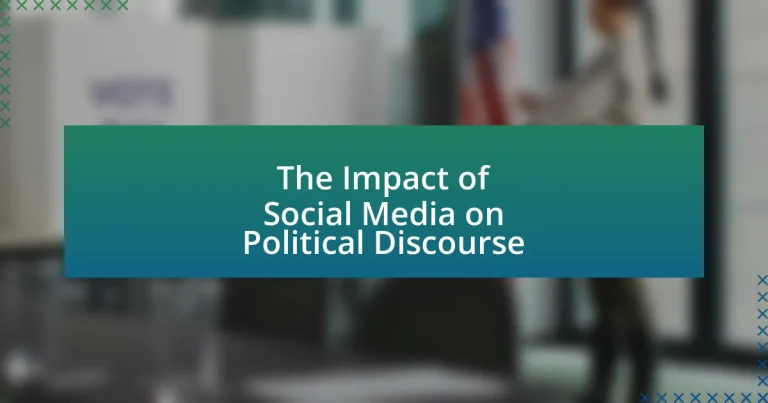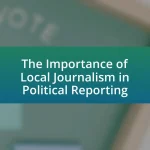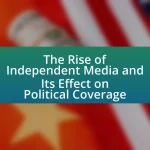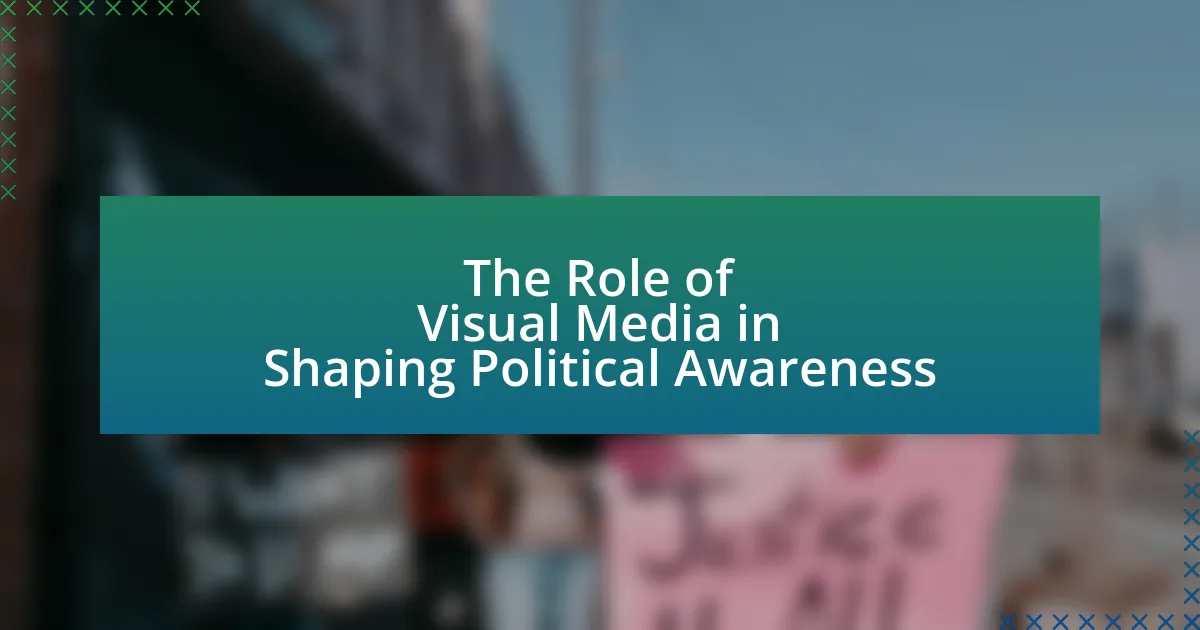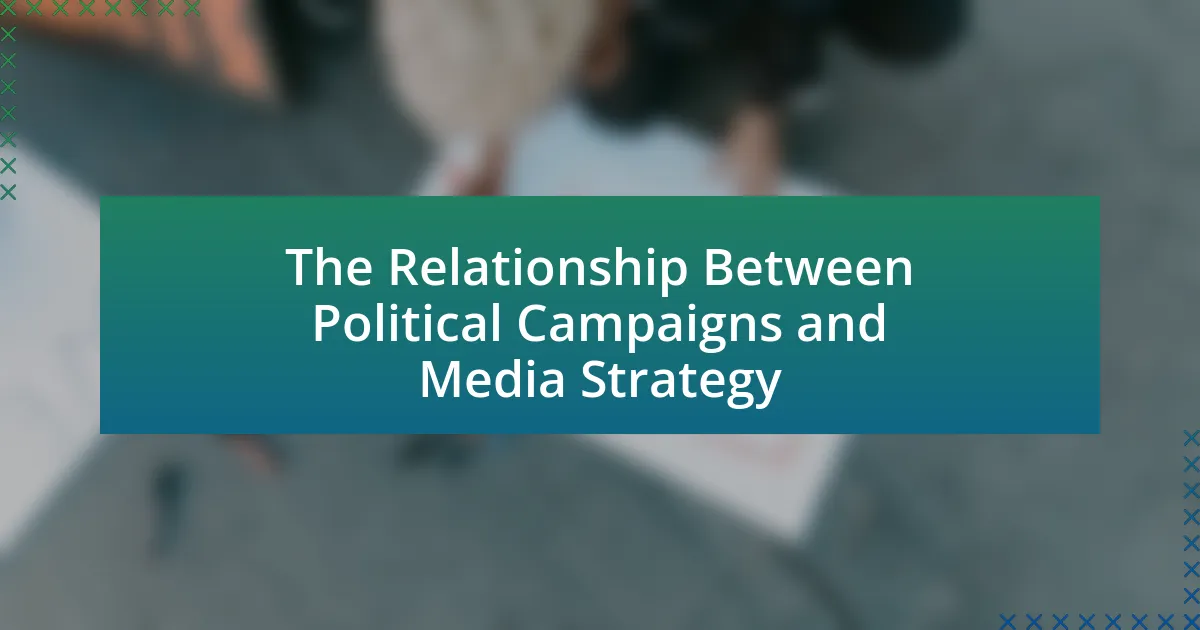The article examines the significant impact of social media on political discourse, highlighting its role in facilitating rapid information dissemination and amplifying diverse viewpoints. It discusses how social media transforms traditional political communication by enabling direct interaction between politicians and the public, leading to increased political participation and the rise of grassroots movements. Key features such as user-generated content, real-time communication, and algorithm-driven content curation are analyzed for their influence on public opinion and political polarization. The article also addresses the challenges posed by misinformation and echo chambers, while exploring the potential positive effects of social media in promoting inclusivity and engagement among marginalized voices in politics.
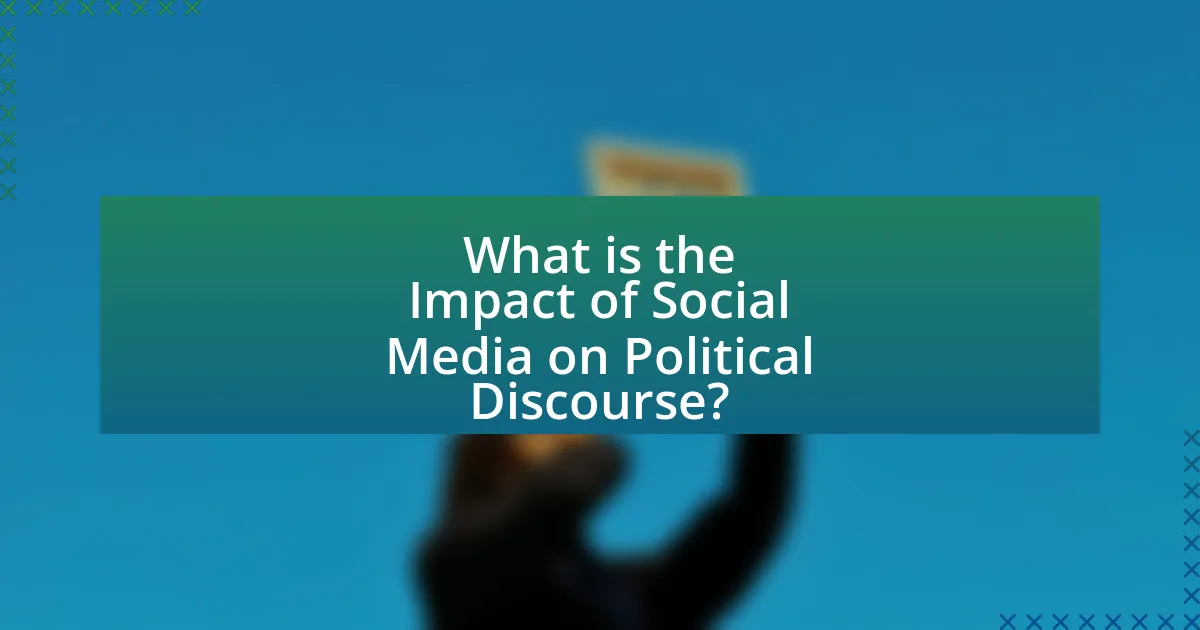
What is the Impact of Social Media on Political Discourse?
The impact of social media on political discourse is significant, as it facilitates rapid information dissemination and amplifies diverse viewpoints. Social media platforms enable users to engage in discussions, share opinions, and mobilize support for political causes, often leading to increased political participation. According to a Pew Research Center study, 69% of adults in the U.S. use social media, which has transformed how political information is consumed and shared. This shift has also contributed to the rise of echo chambers, where individuals are exposed primarily to viewpoints that reinforce their own beliefs, potentially polarizing political opinions. Furthermore, social media has been instrumental in organizing movements, such as the Arab Spring, demonstrating its power in shaping political landscapes.
How has social media transformed traditional political communication?
Social media has transformed traditional political communication by enabling direct interaction between politicians and the public, bypassing traditional media gatekeepers. This shift allows for real-time engagement, where politicians can share messages instantly and respond to constituents’ concerns without delay. For instance, during the 2008 U.S. presidential election, Barack Obama’s campaign effectively utilized platforms like Facebook and Twitter to mobilize voters and disseminate information, resulting in a significant increase in voter turnout among younger demographics. This direct communication has also led to the rise of grassroots movements, as seen in the Arab Spring, where social media played a crucial role in organizing protests and spreading awareness.
What are the key features of social media that influence political discourse?
The key features of social media that influence political discourse include user-generated content, real-time communication, algorithm-driven content curation, and network effects. User-generated content allows individuals to share opinions and information, shaping public perception and debate. Real-time communication facilitates immediate responses to political events, enabling rapid dissemination of information and mobilization of public opinion. Algorithm-driven content curation prioritizes certain viewpoints, potentially creating echo chambers that reinforce existing beliefs. Network effects amplify messages as users share content within their social circles, increasing visibility and impact. These features collectively alter how political discussions are conducted and perceived in society.
How do different social media platforms affect political messaging?
Different social media platforms significantly affect political messaging by shaping how information is disseminated and consumed. For instance, Twitter’s character limit encourages concise messaging, which can lead to oversimplification of complex political issues, while Facebook’s algorithm prioritizes engagement, often amplifying sensational content that may distort political narratives. Research by the Pew Research Center indicates that 64% of Americans believe social media has a mostly negative effect on the way things are going in the country today, highlighting concerns about misinformation and polarization. Additionally, platforms like Instagram utilize visual content, which can influence political perceptions through imagery rather than text, further altering the landscape of political communication.
Why is understanding the impact of social media on political discourse important?
Understanding the impact of social media on political discourse is important because it shapes public opinion and influences democratic processes. Social media platforms facilitate rapid information dissemination, allowing political messages to reach vast audiences quickly. For instance, a Pew Research Center study found that 69% of adults in the U.S. use social media, making it a critical space for political engagement and debate. This widespread use can amplify misinformation, polarize opinions, and affect voter behavior, as seen in the 2016 U.S. presidential election where social media played a significant role in shaping narratives. Therefore, comprehending this impact is essential for fostering informed citizenship and ensuring the integrity of democratic systems.
What role does social media play in shaping public opinion?
Social media significantly influences public opinion by providing a platform for rapid information dissemination and engagement. It allows individuals to share their views, access diverse perspectives, and mobilize collective action, which can sway public sentiment on various issues. For instance, studies show that social media platforms like Twitter and Facebook can amplify political messages, with research indicating that 64% of users report that social media influences their political views. Additionally, the ability to interact with content through likes, shares, and comments creates a feedback loop that reinforces certain narratives, further shaping public perception.
How does social media contribute to political polarization?
Social media contributes to political polarization by facilitating echo chambers where users are exposed primarily to viewpoints that reinforce their existing beliefs. Algorithms on platforms like Facebook and Twitter prioritize content that aligns with users’ preferences, leading to a lack of exposure to diverse perspectives. Research by the Pew Research Center indicates that individuals who engage heavily with social media are more likely to hold extreme political views, as they interact with like-minded individuals and consume partisan content. This selective exposure exacerbates divisions, making it difficult for users to engage in constructive dialogue across the political spectrum.
What are the potential positive effects of social media on political discourse?
Social media positively influences political discourse by enhancing public engagement and facilitating diverse viewpoints. Platforms like Twitter and Facebook allow users to share opinions, mobilize support for causes, and participate in discussions that were previously limited to traditional media. Research indicates that social media can increase political participation; for instance, a study by the Pew Research Center found that 69% of adults in the U.S. use social media, with many reporting that these platforms help them stay informed about political issues. Additionally, social media enables marginalized voices to be heard, promoting inclusivity in political conversations. This democratization of information fosters a more informed electorate, ultimately contributing to a healthier democratic process.
How does social media facilitate political engagement and activism?
Social media facilitates political engagement and activism by providing platforms for individuals to share information, mobilize supporters, and organize events. These platforms enable rapid dissemination of news and opinions, allowing users to engage in discussions and debates about political issues. For instance, during the Arab Spring, social media was instrumental in organizing protests and sharing real-time updates, which significantly contributed to the movements’ visibility and impact. Additionally, studies show that social media users are more likely to participate in political activities, with a Pew Research Center report indicating that 69% of social media users have engaged in political discussions online. This connectivity fosters a sense of community and collective action, empowering individuals to advocate for change.
What opportunities does social media provide for marginalized voices in politics?
Social media provides marginalized voices in politics with platforms for visibility, engagement, and mobilization. These platforms enable individuals and groups who are often underrepresented in traditional media to share their perspectives, organize grassroots movements, and connect with wider audiences. For instance, the #BlackLivesMatter movement gained significant traction through social media, allowing activists to raise awareness about racial injustice and mobilize protests globally. Additionally, studies show that social media can amplify the voices of women and LGBTQ+ communities, facilitating discussions that challenge dominant narratives and promote inclusivity in political discourse.
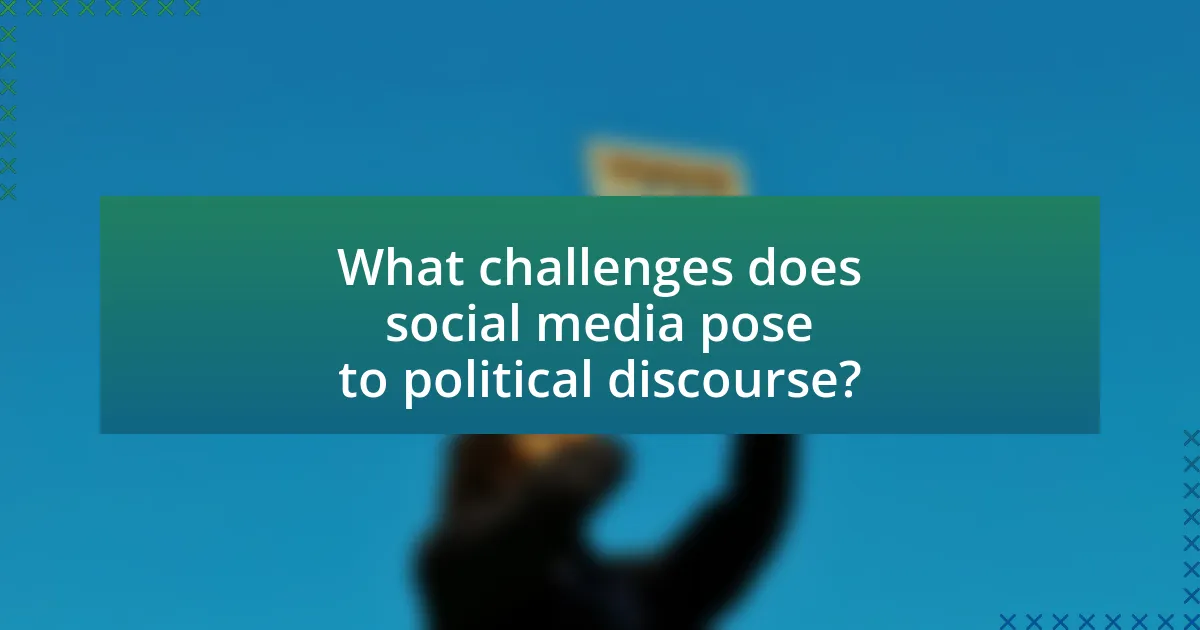
What challenges does social media pose to political discourse?
Social media poses significant challenges to political discourse by facilitating the spread of misinformation and creating echo chambers. Misinformation can rapidly circulate on platforms like Facebook and Twitter, leading to distorted perceptions of political issues; for instance, a 2020 study by the Pew Research Center found that 64% of Americans believe that misinformation causes confusion about basic facts. Additionally, echo chambers occur when users engage primarily with like-minded individuals, reinforcing their beliefs and reducing exposure to diverse viewpoints; research from the University of California, Berkeley, indicates that this phenomenon can lead to increased polarization in political opinions. These challenges undermine informed debate and can distort democratic processes.
How does misinformation spread on social media platforms?
Misinformation spreads on social media platforms primarily through user engagement and algorithmic amplification. When users share, like, or comment on misleading content, it gains visibility, leading to further dissemination. A study by the Massachusetts Institute of Technology found that false news stories are 70% more likely to be retweeted than true stories, highlighting the role of social media dynamics in spreading misinformation. Additionally, algorithms prioritize content that generates high engagement, often favoring sensational or misleading information over factual reporting, which exacerbates the issue.
What are the consequences of misinformation for political discourse?
Misinformation significantly undermines political discourse by distorting public perception and eroding trust in democratic institutions. When false information spreads, it can lead to polarized opinions, as individuals may base their beliefs on inaccurate data, resulting in a fragmented political landscape. A study by the Pew Research Center found that 64% of Americans believe fabricated news stories cause confusion about the basic facts of current events, illustrating the detrimental effect of misinformation on informed decision-making. Furthermore, misinformation can incite social unrest and influence electoral outcomes, as seen in various elections where misleading narratives swayed voter behavior.
How can users identify and combat misinformation on social media?
Users can identify and combat misinformation on social media by critically evaluating the sources of information and verifying facts before sharing. This involves checking the credibility of the source, looking for corroborating evidence from reputable outlets, and using fact-checking websites like Snopes or FactCheck.org. Research indicates that misinformation spreads more rapidly on social media platforms, with a study by Vosoughi, Roy, and Aral (2018) in “Science” revealing that false news stories are 70% more likely to be retweeted than true stories. By employing these strategies, users can reduce the spread of false information and contribute to a more informed online discourse.
What impact does social media have on political campaigns?
Social media significantly influences political campaigns by enhancing candidate visibility and facilitating direct voter engagement. Platforms like Twitter and Facebook allow candidates to communicate their messages instantly, reaching millions of potential voters. For instance, during the 2016 U.S. presidential election, Donald Trump utilized Twitter to bypass traditional media, directly addressing supporters and shaping public discourse. Research indicates that 62% of voters reported that social media influenced their voting decisions, highlighting its role in shaping political opinions and mobilizing grassroots support.
How do candidates utilize social media for campaigning?
Candidates utilize social media for campaigning by engaging directly with voters, disseminating information, and mobilizing support. They create targeted advertisements and posts to reach specific demographics, leveraging platforms like Facebook, Twitter, and Instagram to share their messages and policies. For instance, during the 2020 U.S. presidential election, candidates used social media to reach millions of users, with Joe Biden’s campaign reportedly spending over $100 million on digital ads, highlighting the effectiveness of social media in modern political strategies. This approach allows candidates to respond quickly to current events and engage in real-time discussions, enhancing their visibility and connection with the electorate.
What are the implications of social media advertising in politics?
Social media advertising in politics significantly influences voter behavior and public opinion. It allows political campaigns to target specific demographics with tailored messages, enhancing engagement and mobilization. For instance, during the 2016 U.S. presidential election, targeted ads on platforms like Facebook were shown to effectively sway undecided voters, as evidenced by a study from the Pew Research Center, which found that 62% of adults obtained news from social media. Additionally, social media advertising can amplify misinformation, as seen in various elections worldwide, where false narratives spread rapidly, impacting electoral outcomes. This duality of influence underscores the critical role social media plays in shaping political landscapes.
How does social media influence political discourse across different demographics?
Social media significantly influences political discourse across different demographics by shaping the way individuals engage with political content and interact with one another. For instance, younger demographics, particularly those aged 18-29, are more likely to use platforms like Twitter and Instagram, which facilitate rapid sharing of political opinions and mobilization around social issues. According to a Pew Research Center study, 55% of this age group reports that social media is a primary source of political news, impacting their political beliefs and engagement levels.
In contrast, older demographics, such as those aged 50 and above, tend to prefer Facebook, where political discourse often includes more extensive discussions and sharing of articles. This demographic is also more susceptible to misinformation, as studies indicate that older adults are less adept at identifying false information compared to younger users. The same Pew Research Center report highlights that 64% of older adults have encountered misinformation on social media, which can skew their understanding of political issues.
Overall, social media acts as a catalyst for political discourse, with its influence varying significantly across age groups, leading to different levels of engagement, information consumption, and susceptibility to misinformation.
What differences exist in social media usage among various age groups?
Younger age groups, particularly those aged 18-29, predominantly use social media platforms like Instagram and TikTok for communication and content sharing, while older age groups, such as those aged 50 and above, tend to favor Facebook for connecting with family and friends. According to the Pew Research Center’s 2021 data, 84% of adults aged 18-29 use Instagram, compared to only 32% of adults aged 50 and older. Additionally, 69% of adults aged 50 and older use Facebook, highlighting its appeal among older users. This generational divide in platform preference influences the type of political discourse each group engages with, as younger users often gravitate towards more visual and interactive content, while older users may engage in more traditional forms of communication and information sharing.
How do cultural factors affect political discourse on social media?
Cultural factors significantly shape political discourse on social media by influencing the values, beliefs, and communication styles of users. For instance, cultural norms dictate how individuals express political opinions, leading to variations in discourse across different regions. Research indicates that in collectivist cultures, users may prioritize group harmony and consensus, resulting in more moderated discussions, while in individualistic cultures, users often engage in more confrontational and polarized debates. A study by the Pew Research Center found that cultural context affects the way political information is shared and interpreted, with users from diverse backgrounds exhibiting distinct patterns in their engagement with political content.
What are the future trends of social media’s impact on political discourse?
Future trends of social media’s impact on political discourse include increased polarization, the rise of misinformation, and enhanced engagement through interactive platforms. Social media algorithms are likely to prioritize content that generates strong emotional responses, leading to more extreme viewpoints being amplified. Research indicates that 64% of Americans believe misinformation has a significant impact on political discourse, highlighting the challenge of false narratives spreading rapidly online. Additionally, as platforms evolve, features that promote direct interaction between politicians and constituents may foster greater civic engagement, but they also risk creating echo chambers where dissenting opinions are marginalized.
How might emerging technologies shape political communication on social media?
Emerging technologies significantly shape political communication on social media by enhancing the speed, reach, and personalization of messages. These technologies, such as artificial intelligence and machine learning algorithms, enable political entities to analyze vast amounts of data, allowing for targeted messaging that resonates with specific demographics. For instance, the use of AI-driven analytics can identify voter preferences and behaviors, leading to tailored campaign strategies that increase engagement and influence public opinion. Additionally, advancements in real-time communication tools facilitate immediate responses to political events, enabling rapid dissemination of information and mobilization of supporters. This dynamic environment has been evidenced by the 2016 U.S. presidential election, where social media platforms played a crucial role in shaping narratives and influencing voter perceptions through targeted ads and viral content.
What role will artificial intelligence play in moderating political content?
Artificial intelligence will play a crucial role in moderating political content by automating the detection and removal of harmful or misleading information. AI algorithms analyze vast amounts of data to identify patterns associated with misinformation, hate speech, and other forms of harmful content. For instance, platforms like Facebook and Twitter utilize AI to flag posts that violate community standards, significantly reducing the spread of false narratives. Research from the Pew Research Center indicates that AI-driven moderation can improve the efficiency of content review processes, allowing for quicker responses to emerging political issues.
How can social media platforms evolve to enhance political discourse?
Social media platforms can evolve to enhance political discourse by implementing algorithms that prioritize diverse viewpoints and factual information. This evolution can be achieved through the integration of fact-checking mechanisms and user-driven content moderation, which have been shown to reduce the spread of misinformation. For instance, platforms like Facebook have initiated partnerships with third-party fact-checkers to verify claims, leading to a decrease in the visibility of false information. Additionally, promoting features that encourage civil debate, such as structured discussion forums or prompts for respectful engagement, can foster a more constructive environment for political dialogue. Research indicates that environments encouraging respectful discourse can lead to more informed and engaged users, ultimately enhancing the quality of political discussions online.
What best practices can individuals and organizations adopt for effective political discourse on social media?
Individuals and organizations can adopt several best practices for effective political discourse on social media, including promoting respectful dialogue, fact-checking information before sharing, and engaging with diverse perspectives. Respectful dialogue fosters a constructive environment, reducing hostility and encouraging open communication. Fact-checking is essential, as misinformation can spread rapidly; for instance, a study by the Pew Research Center found that 64% of Americans believe misinformation causes confusion about basic facts. Engaging with diverse perspectives broadens understanding and promotes empathy, which is crucial in a polarized political landscape. By implementing these practices, participants can enhance the quality of political discourse on social media platforms.
How can users engage constructively in political discussions online?
Users can engage constructively in political discussions online by practicing active listening and respectful dialogue. Active listening involves fully concentrating on what others are saying, which fosters understanding and reduces miscommunication. Respectful dialogue means addressing differing opinions without resorting to personal attacks or inflammatory language, which can escalate tensions. Research indicates that constructive engagement leads to more productive conversations and can bridge divides; for instance, a study by the Pew Research Center found that individuals who engage respectfully are more likely to find common ground and develop mutual respect, enhancing the overall quality of political discourse.
What strategies can organizations implement to promote healthy political dialogue on social media?
Organizations can implement several strategies to promote healthy political dialogue on social media, including establishing clear community guidelines, fostering inclusive conversations, and providing educational resources. Clear community guidelines help set expectations for respectful interactions, reducing the likelihood of toxic exchanges. Fostering inclusive conversations encourages diverse viewpoints, which can lead to more balanced discussions and a deeper understanding of various perspectives. Providing educational resources, such as fact-checking tools and information on civic engagement, empowers users to engage thoughtfully and critically with political content. Research indicates that platforms with strong moderation policies and educational initiatives see a reduction in misinformation and an increase in constructive dialogue, highlighting the effectiveness of these strategies.
